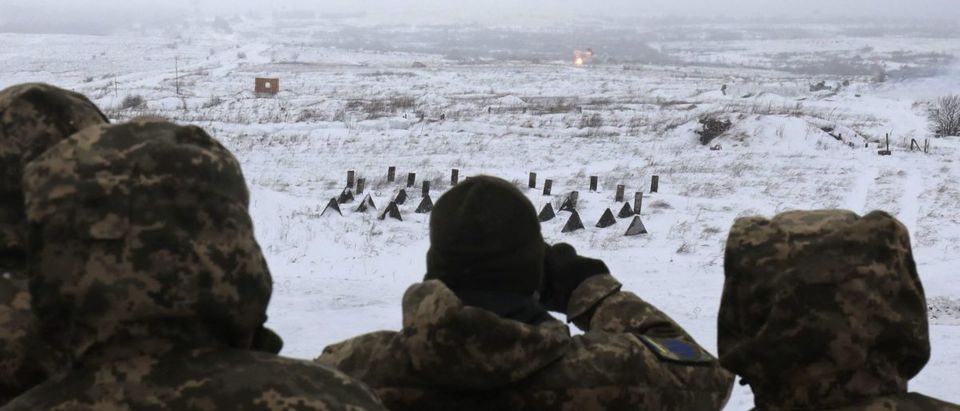Editor’s note: We endeavor to bring you the top voices on current events representing a range of perspectives. Below is a column arguing that NATO’s mobilization over the Ukraine crisis is a dangerous overreach and makes war with Russia more likely. You can find a counterpoint here, where Ilan Berman of the American Foreign Policy Council argues it is an effective way to deter Russia from pushing its claims.
Ukraine remains an international hot spot given continued signs of a possible Russian invasion. Several NATO countries have responded not just with rhetorical support for Kyiv, but also military moves of their own.
A recent NATO statement notes that “Allies are putting forces on standby and sending additional ships and fighter jets to NATO deployments in eastern Europe.” This includes Denmark sending a naval vessel and fighters to the Baltics, the Dutch sending two F-35 fighter jets to Bulgaria, and France readying for possible troop movements to Romania. The British have been the most hawkish, with Prime Minister Boris Johnson signaling he may bolster its roughly 1,000-member force now in Ukraine, Estonia and Poland by ordering its “armed forces to prepare to deploy across Europe next week.”
Despite little appetite among Americans for war, the Biden administration has also stepped up its response to the crisis, putting 8,500 U.S. troops on standby for possible deployment to Eastern Europe.
While many would view these efforts as wise reassurance for NATO’s eastern allies, these moves are actually unnecessary and could exacerbate Russian security fears that precipitated the Ukraine crisis in the first place. Therefore, NATO and the U.S. should tread more carefully and avoid actions that could make matters worse, including moving up the escalatory ladder into a costly war. Even if we manage to stay out of direct conflict, war would be quite bad for the Ukrainians themselves.
Beefing up forces in Europe would be needed if there were any serious indications Russia was set on invading a current NATO ally since the current forces add little besides guaranteeing more casualties to an already existing “tripwire” force.
Fortunately, there is no evidence that Russia aims to take military action against any NATO member or other U.S. ally. Indeed, given the overall balance of power between NATO countries and Russia, Putin would be quite foolish to encroach upon allied territory.
Instead, Russia’s military build-up is focused on Ukraine, a country that is not a U.S. ally or member of NATO. Russia’s moves are primarily a response to its security fears about Ukraine becoming closer with the West, especially a possible membership in NATO. That result could enable western forces, especially American troops, to be cheek by jowl with Russia along that country’s long, easily penetrated border.
Without excusing any invasion to prevent NATO accession, Russia’s security concern about Ukraine joining the West should be viewed as a reasonable response from the perspective of Russia’s leaders. Americans have been concerned about Russian and Chinese influence in nearby countries like Mexico and Cuba, and Russia’s concerns over Ukraine should be seen in that same vein.
Another problem with these NATO moves is that we cannot be sure that the signal we want to send to our allies and adversary is the one the Russians will receive. Rather than signaling our commitment to our existing allies, they could be perceived as threatening Russian safety or part of a plan to back Ukraine in the event of hostilities. This could exacerbate the security dilemma and push Russia to act sooner rather than later when the local balance of power would not be as favorable.
Any further U.S. moves could also have another negative unintended consequence. American leadership could continue to encourage the kind of “cheap-riding” and “reckless driving” on the part of Ukraine and our allies that has been emblematic of the post-Cold War era. And we certainly should avoid any signal to Ukraine that would suggest we might rescue it in a conflict with Russia, lest it take actions or continue to dig in its heels in a way that make a war more likely.
With rhetorical and symbolic, but not credible, support from the U.S., Ukraine backed itself into a corner with Russia that was avoidable. This crisis is the latest “own-goal” that realists have warned about for years. Ukraine simply doesn’t add to our safety or prosperity, and flirting with NATO has a significant downside. It undermines our safety by making it more likely that we could clash with Russia and see a crisis spiral into a conventional or even nuclear conflict.
Thus, we should have closed NATO’s open door long ago and stopped with the lofty pronouncements about standing with Ukraine and trumpeting its right to choose its own foreign policy path. Taking NATO expansion out of the mix might yet mitigate the security dilemma with Russia, ending this crisis and making similar crises (as we’ve seen in Ukraine and Georgia) less likely. It could also prevent Russia’s detente with China to balance against the United States.
But now the current crisis is before us, and so something is going to have to give unless Putin flinches. Rather than focus on reassurance of our already safe allies, we should just be honest: Russia is likely to get its way one way or another. Ukraine can’t win by itself and we are unlikely to intentionally go to war to save it. Ukraine just doesn’t matter enough to us. Therefore, we should focus on diplomacy that finds a responsible way of mollifying Russia with a believable assurance that we aren’t serious about Ukraine ever joining NATO while emphasizing that there is no stepping away from commitments to our current allies. Ending the fantasy of further NATO enlargement would also give up nothing that matters to America’s vital national interests.
William Ruger is the president of the American Institute for Economic Research and a Distinguished Non-Resident Fellow at Defense Priorities.


